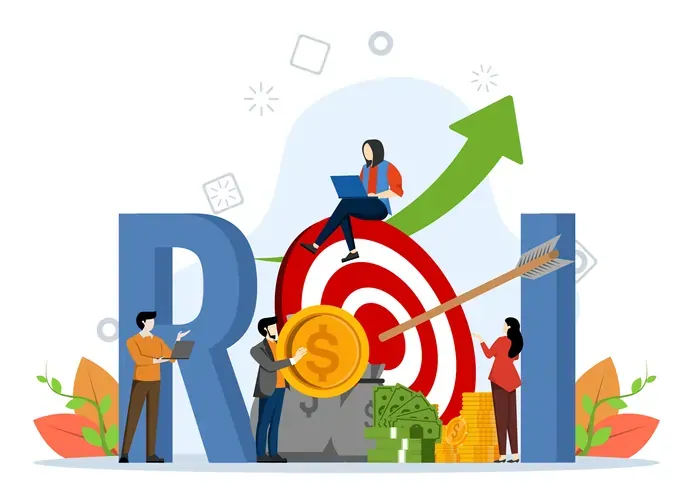
Measuring the ROI of digital marketing efforts
In today’s fast-paced digital world, the significance of digital marketing in driving business success cannot be overstated. From small startups to multinational corporations, the quest to understand the return on investment (ROI) from digital marketing efforts has become paramount. This article aims to unravel the complexities of measuring digital marketing ROI, providing a comprehensive analysis that blends theory with practical insights.
Understanding Digital Marketing ROI
At its core, digital marketing ROI is a metric that evaluates the profitability of your digital marketing campaigns. It tells you whether your marketing efforts are paying off, essentially measuring the bang for your marketing buck. But, the process of measuring digital marketing ROI goes beyond simple arithmetic; it involves understanding which metrics matter and how they interconnect to tell the broader story of your digital marketing success or areas needing improvement.
Why Measuring ROI Is Critical
Measuring the ROI of digital marketing efforts is critical for several reasons. It enables marketers to quantify the effectiveness of their marketing strategies, justify marketing spend, and make informed decisions about future marketing tactics. Without a clear understanding of ROI, businesses are essentially flying blind, investing in digital marketing without knowing what works, what doesn’t, and why.
The Challenges of Measuring Digital Marketing ROI
Measuring digital marketing ROI is fraught with challenges. The digital marketing landscape is vast, encompassing everything from social media and email marketing to SEO and content marketing. Each channel has its unique set of metrics, making it difficult to aggregate data into a coherent picture of overall ROI. Moreover, the path from exposure to conversion can be nonlinear, complicating the attribution of sales to specific marketing efforts.
Key Metrics for Measuring Digital Marketing ROI
Several key metrics are essential for measuring digital marketing ROI. These include conversion rates, cost per acquisition (CPA), customer lifetime value (CLV), and social media engagement rates, among others. Understanding these metrics and how they relate to each other is crucial for accurately assessing the effectiveness of digital marketing campaigns.
Strategies for Improving Digital Marketing ROI
Improving digital marketing ROI requires a strategic approach that encompasses optimizing campaign targeting, refining content strategies, leveraging data analytics for insight-driven decisions, and continuously testing and tweaking marketing tactics. Implementing these strategies can significantly enhance the efficiency and effectiveness of digital marketing efforts.
Tools and Technologies for Measuring ROI
A plethora of tools and technologies are available to help marketers measure digital marketing ROI. These range from analytics platforms like Google Analytics to CRM software that tracks customer interactions and conversions. Choosing the right tools and learning how to use them effectively is critical for accurate ROI measurement.
Case Studies: Success Stories of Digital Marketing ROI
Examining real-world case studies of successful digital marketing campaigns can provide valuable insights into effective ROI measurement strategies. These case studies highlight the importance of a well-defined digital marketing strategy, precise targeting, and the creative use of digital platforms to maximize ROI.
Expert Opinions on Digital Marketing ROI
Insights from industry experts can shed light on best practices and emerging trends in measuring digital marketing ROI. These experts emphasize the importance of a customer-centric approach, the integration of cross-channel data, and the continuous adaptation of marketing strategies to meet the changing digital landscape.
Integrating Multi-Channel Funnels for Comprehensive ROI Analysis
One advanced strategy for enhancing the measurement of digital marketing ROI is the integration of multi-channel funnels. This approach acknowledges that the customer journey is rarely linear and often spans multiple digital channels before leading to a conversion. By analyzing how different channels interact and contribute to the final conversion, marketers can allocate resources more effectively and increase the overall efficiency of their digital marketing efforts.
Leveraging Emerging Technologies for Precision in ROI Tracking
Emerging technologies, particularly artificial intelligence (AI) and machine learning, are poised to dramatically improve the precision of ROI tracking. AI algorithms can sift through massive datasets to identify patterns and insights that would be impossible for humans to discern, offering predictions and recommendations to optimize marketing spend. Machine learning, on the other hand, can continuously refine these predictions based on new data, ensuring that the strategies remain relevant and effective.
The Importance of a Holistic View in Measuring ROI
Adopting a holistic view is critical when measuring the ROI of digital marketing efforts. This means looking beyond immediate metrics and considering factors such as brand awareness, customer satisfaction, and long-term customer value. A holistic view also recognizes the interplay between various marketing channels and the cumulative impact of all marketing efforts on the bottom line.
Personalization and Its Impact on Digital Marketing ROI
Personalization is another key factor that can significantly impact digital marketing ROI. By tailoring marketing messages and offers to individual preferences and behaviors, businesses can increase engagement rates, conversion rates, and ultimately, ROI. Advanced data analytics and customer segmentation are essential for effective personalization, enabling marketers to deliver the right message to the right person at the right time.
The Role of Content Marketing in Enhancing ROI
Content marketing plays a pivotal role in enhancing digital marketing ROI. High-quality, relevant, and engaging content can attract and retain customers, build brand authority, and drive conversions. The key to successful content marketing is understanding the audience’s needs and interests and creating content that addresses them in a compelling way. Measuring the ROI of content marketing involves tracking metrics such as traffic, engagement, lead generation, and sales attributed to content.
Innovative Approaches to Boosting Digital Marketing ROI
Innovation is crucial for boosting digital marketing ROI. This can include experimenting with new digital platforms, adopting cutting-edge marketing technologies, or exploring creative marketing tactics. The willingness to take calculated risks and learn from both successes and failures can lead to breakthroughs in digital marketing effectiveness.
Sustainability and Ethical Marketing: Their Influence on ROI
Sustainability and ethical marketing are increasingly becoming important considerations for consumers. Brands that align their digital marketing efforts with these values can enhance their reputation, foster customer loyalty, and, consequently, improve their ROI. This involves transparent communication, ethical use of data, and a commitment to sustainable practices in all marketing endeavors.
Future Trends in Measuring Digital Marketing ROI
As the digital marketing landscape continues to evolve, so too will the strategies and tools for measuring ROI. Emerging technologies like artificial intelligence (AI) and machine learning are set to revolutionize how marketers track and analyze the effectiveness of their digital marketing efforts, offering unprecedented precision and insights.
FAQs
How does AI influence digital marketing ROI? AI influences digital marketing ROI by enabling more accurate targeting, predictive analytics for customer behavior, and personalized marketing at scale, leading to higher efficiency and effectiveness of marketing campaigns.
Is it possible to attribute offline sales to digital marketing efforts? Yes, through techniques such as matched market analysis, unique promotion codes, and customer surveys, businesses can attribute offline sales to digital marketing efforts, providing a more complete picture of ROI.
How often should ROI be measured for digital marketing campaigns? ROI should be measured continuously, with periodic in-depth analyses. This allows for real-time optimization of campaigns and long-term strategic adjustments based on performance trends.
Can social media sentiment analysis impact digital marketing ROI measurement? Yes, social media sentiment analysis can provide insights into brand perception and customer satisfaction, which are important indicators of the long-term impact of digital marketing efforts on ROI.
Conclusion
The journey to accurately measure and optimize the ROI of digital marketing efforts is complex and multifaceted. By embracing advanced strategies, leveraging emerging technologies, and maintaining a holistic view, businesses can navigate this landscape more effectively. Personalization, content marketing, innovation, and a commitment to sustainability and ethical practices are all pivotal in enhancing digital marketing ROI. As we look to the future, the continuous evolution of digital marketing presents both challenges and opportunities for marketers striving to maximize their return on investment. With a commitment to learning, adaptation, and strategic insight, the potential to drive unparalleled marketing success is within reach.


